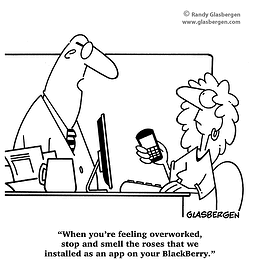“Success takes hard work – nothing is handed to you on a silver platter.”
“If you don’t work hard and get good grades, you’ll never amount to anything.”
“If you’re not walking around with a destination in mind, you’re wasting time.”
“Time is money.”
“Once I’ve established my career and made my money, then I will relax and enjoy life.” (This last one is something you may say to yourself after working overtime for the umpteenth time and blowing off your friends/family again).
So what have these words of wisdom generated? Some very industrious, high-achieving workaholics who are intent on outrunning and outdoing everyone else – and whose only time for relaxation is when they end up in hospital bed with a multitude of stress-related health problems. These are what psychologists call “Type A Personalities.”

People with a Type A Personality are characterized by two main traits: achievement striving (made up of competitiveness, perfectionism, and drive), and impatience/irritability (made up of hostility, time urgency, tough-mindedness, and reward orientation).
While achievement striving can be productive and is conducive to success, it can be taken to an extreme (case in point: overachievers and workaholics). The impatience/irritability side of Type A people is often the most damaging; there is a constant need to get things done NOW, the inability to trust, depend on, or open up to others, and the intense desire to get more and more money, status, and power.
Type B people, as you can imagine, are generally the opposite of Type A’s. They are calmer, less competitive, and less intensely focused on achievement (although they do take pride in their accomplishments and will work hard for something important), and tend to take life at a more steady pace.
Looking at data from 7,500 people who took our Type A Personality Test, analyses reveal a number of interesting differences in the traits that characterize Type A Personality.
Gender comparisons indicate that while women have a greater sense of time urgency, men tend to be more competitive and tough-minded (rigid in thought and conduct; uncomfortable with expression of emotion), and motivated by external incentives like money, power and status.
Age comparisons indicate that competitiveness, hostility, tough-mindedness, reward orientation, perfectionism, achievement striving, and impatience/irritability tend to peak between the ages of 25-29, and then drop steadily.
There’s no denying that Type As can achieve great things if they channel their achievement orientation in a healthy way. The problem is that they spend so much time and energy on achieving one success after another that they don’t actually have the time to enjoy the fruits of their labor. Not to mention the fact that personality-wise, they can often be seen as abrasive, impatient, and self-absorbed.
And if the world needed additional proof that more money doesn’t necessarily make a person happy, our data reveals that individuals in the highest salary bracket ($100,000 or more) score higher than the other income groups on all the traits related to Type A personality. In addition, self-proclaimed workaholics, not surprisingly, scored higher than non-workaholics on the Type A traits.
When it comes to work satisfaction and performance, those who are not satisfied with their job and those whose performance has been rated poorly scored the highest on hostility, time urgency, tough-mindedness, reward orientation, perfectionism, and impatience/irritability. Remarkably, those who love their job and perform well and those who hate their job and perform poorly are equally competitive and driven. The difference between these two groups is their success orientation.
For Type As, their lives become a vicious cycle of wanting more and more in so little time that they either lose their friends and family or their health – or both. Type A personalities don’t know how to relax and enjoy life; they will even manage to turn the little time they do take off into a conquest. When it comes to recreation, they hit the ground running –they just never slow down.
If you suspect that you’re a Type A, the advice below offers tips to help channel your personality in a healthy way. If you’re not sure what type you are, you can take the Type A Personality Test.
- Know when to compete and when to let go. Recognize your accomplishments, give yourself a pat on the back, and leave the winning to others from time to time. Learn to let go. We've been taught to compete, to do everything we can to win. But there are so many times when the game isn't worth playing. We all need to learn to save our energy for the important battles, and to let go of those things that don't count in the long run. There is so much that happens in the course of our lives that is not ultimately important to our welfare. Learn to distinguish what really matters and pick your battles.
- Re-examine your long-term goals. Is the rat race really leading you towards where you want to be? Are you enjoying the journey? When you reach a ripe old age and look back at your life, what do you want to be able to say about how you spent your years?
- Enjoy the process. People who feel they have successful lives uniformly emphasize the fact that success is a process. Though having goals is instrumental, there are really no final end points. Things continue to evolve. Goals change and we change. If you can't enjoy everyday life and instead, live only for some moment in the distant future, you are cheating yourself and those who love you. So remember, the process is everything. Have fun and appreciate it while it's happening.
- Tackle one thing at a time. Don't try to do too much at once. You'll only end up doing a so-so job, and won't truly get the best out of every experience.
- Don't get caught up in competitiveness. Sure, you want to want to succeed and a little bit of competition is healthy, but too much too often can push you toward the brink of burnout. Ask yourself if being number one is really worth jeopardizing your health.
- Don't try to be perfect. Setting extremely high standards for yourself will only amount to added pressure. Accept that you are human, and forgive yourself for making mistakes. Learn to appreciate errors as learning experiences.
- Learn how to express your emotions in a healthy manner. The most toxic personality traits of Type A people are frequent outbursts of hostility and anger. A tendency to cope with unpleasant events in a rigid, unemotional manner is associated with an increased risk of coronary heart disease and the development and progression of cancer. Therefore, learning to express your emotions in a healthy, constructive way will increase your chances of living a long, healthy life. Work on your ability to communicate, your listening skills, conflict resolution skills, and anger management.
- Spend time with the people who care about you. Everyone needs to feel accepted; it provides a sense of belonging, contentment, and well-being. Spend time with those to whom you can admit your greatest fears, shortcomings, failures, and anxieties, and with whom you can be your real self. True friends will be happy for your success but won't view it as a prerequisite to friendship.
- Give yourself a break. Schedule "down time" for yourself and make sure you stick to it. Turn off your phone, say no to social invitations and do something you truly enjoy. Unwind and pamper yourself...and make it a habit. Remember that "rest" doesn't mean you have to sit idle on the couch all day; it can involve any activity that breaks away from routine. It is important that you expand your definition of relaxation and rest as a state of mind and not an absence of physical or mental activity.
- Learn to master stillness. Challenge yourself to learn how to meditate, do yoga or tai chi. It will be difficult to shut down the constant mental chatter that goes on in your mind, but you are someone who loves to take on difficult tasks, so make the most of it. These techniques will help you to learn how to really relax … both mentally and physically.
- Seek help if you can't cope. When Type A people experience stress, their heart rate and blood pressure climb higher than people who are more easygoing. Don't be afraid to get professional help if you just can't cope. You wouldn't hesitate to see a doctor if you were physically under the weather, would you? Don't wait until you need medical attention.
Let’s go out on a lighter note…

If you’re interested in using tests for HR purposes, request a free trial for ARCH Profile here.
Want to learn more about psychological testing? Download a free eBook – a practical guide on using tests for hiring, leadership/career development, training and team building: Download our free eBook
Ready for a test drive of ARCH Profile, the delivery system for PsychTests’ assessments? All you need to do is ask!


